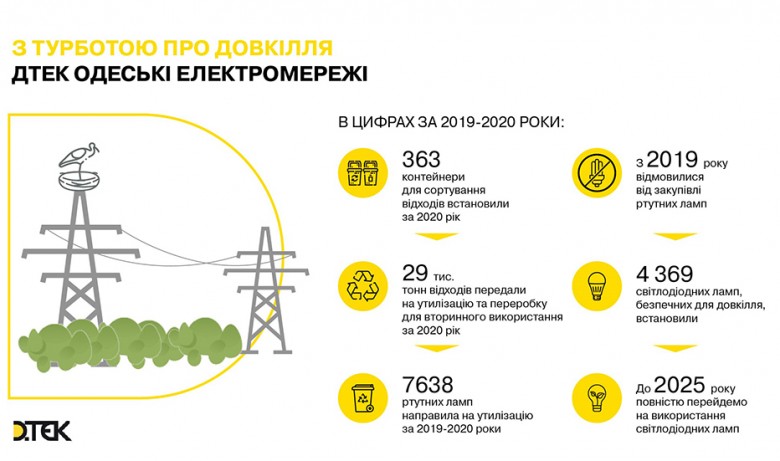Taking care of the environment: DTEK Odesa Grids sends 29 tons of waste for recycling

DTEK Odesa Grids sorts waste into 40 categories, including cardboard and wastepaper, waste batteries, oiled paper, rubber waste, etc. Waste sorting is needed to segregate waste into such that can be used as secondary raw materials and sold, and such that need to be sent for utilization.
“DTEK is transforming its business according to the New Strategy 2030 based on ESG principles, values and business responsibility for progress in achieving the sustainable development goals of the UN Global Compact. DTEK Odesa Grids is sorting waste and sends it to licensed companies to handle waste. Most of the waste is reused. Over the last year we sent around 29 tons of waste for recycling,” says Oleksandr Fomenko, CEO of DTEK Odesa Grids.
The company sells scrap ferrous and non-ferrous metals for third-party organizations. There are reinforced concrete supports left after reconstructing 0.4-10 kV overhead lines, which cannot be used for their intended purpose. In 2020, there were 2,600 of these. The company uses them to build shielded sites.
Also, the company generates more than three tons of broken porcelain insulators annually. It is an inert material that can be used in the production of electrical ceramics, as well as for arranging paths in landscaping. The company is now looking for potential customers.
In addition, DTEK Odesa Grids implements measures that reduce waste generation. Since 2019, the company has not purchased lamps containing mercury. If incandescent lamps or energy-saving lamps fail, they are replaced with LED lamps. In less than two years, the Distribution System Operator installed 4,369 LED lamps and plans to completely phase out the use of mercury-containing lighting fixtures by 2025. Over the past two years, the company sent 7,638 such lamps for recycling.
As previously reported, the company built 28 shielded sites within structural units for temporary waste storage in 2020, and eight more are planned for 2021. Owing to these measures, 2,500 m2 of land are now protected from industrial pollution. The company also pays special attention to labor protection and environmental friendliness of the business. To confirm this, the company has successfully passed an audit and received certificates of compliance with international standards: ISO 45001:2018 and ISO 14001:2015.

